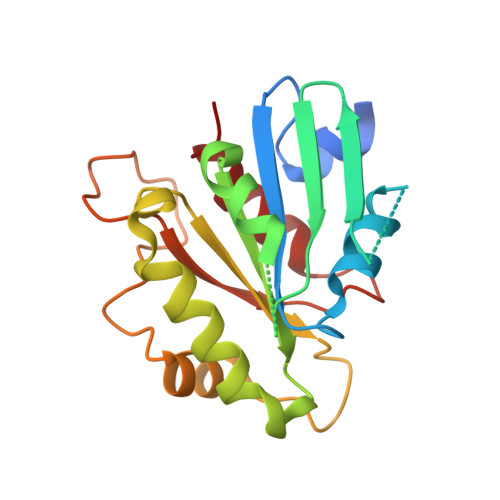The alarmone ppGpp selectively inhibits the isoform A of the human small GTPase Sar1.
Huang, Q., Szebenyi, D.M.E.(2023) Proteins 91: 518-531
- PubMed: 36369712
- DOI: https://doi.org/10.1002/prot.26445
- Primary Citation of Related Structures:
8DZM, 8DZN, 8DZO, 8DZT, 8E0A, 8E0B, 8E0C, 8E0D, 8E0H - PubMed Abstract:
Transport of newly synthesized proteins from endoplasmic reticulum (ER) to Golgi is mediated by coat protein complex II (COPII). The assembly and disassembly of COPII vesicles is regulated by the molecular switch Sar1, which is a small GTPase and a component of COPII. Usually a small GTPase binds GDP (inactive form) or GTP (active form). Mammals have two Sar1 isoforms, Sar1a and Sar1b, that have approximately 90% sequence identity. Some experiments demonstrated that these two isoforms had distinct but overlapping functions. Here we found another instance of differing behavior: the alarmone ppGpp could bind to and inhibit the GTPase activity of human Sar1a but could not inhibit the GTPase activity of human Sar1b. The crystal structures of Sar1a⋅ppGpp and Sar1b⋅GDP have been determined. Superposition of the structures shows that ppGpp binds to the nucleotide-binding pocket, its guanosine base, ribose ring and 5'-diphosphate occupying nearly the same positions as for GDP. However, its 3'-diphosphate points away from the active site and, hence, away from the surface of the protein. The overall structure of Sar1a⋅ppGpp is more similar to Sar1b⋅GDP than to Sar1b⋅GTP. We also find that the Asp140-Arg138-water-ligand interaction net is important for the binding of ppGpp to Sar1a. This study provides further evidence showing that there are biochemical differences between the Sar1a and Sar1b isoforms of Sar1.
Organizational Affiliation:
Cornell High Energy Synchrotron Source (CHESS), Cornell University, Ithaca, New York, USA.
















